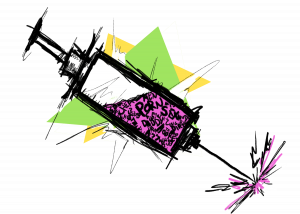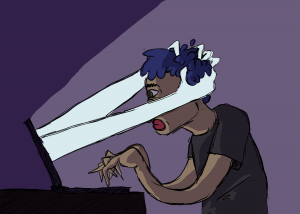
Illustrated by Sam Appru
We have all seen them, those little black boxes. The invasive pop-ups of half-dressed women in provocative poses, mouths open, legs akimbo. You close the window and promise never to illegally download movies again while running your free malware app. The pesky adds are gone. Unfortunately, this is not the process for everyone. Following the explosive popularity of the internet, pornography and sexual advertising has ballooned causing a new addiction to crop up amongst the ethos: Porn addiction. Different to an addiction to sex, Porn addiction is an out of control relationship with sexual images. This involves an inability to stop viewing pornography despite negative consequences or feelings. Due to the dopamine that is released when watching porn, a constant appetite for the stimulant is created and the accompanying increase in shameful feelings causes a more intense desire to escape. Internet porn taps into a natural drive for sexual variety however, constant watching can lead to a viewer feeling compelled to find fresh content which eventually becomes more and more extreme. Porn addicts attempting to recover must try to abstain from the sexual videos and images; but this can prove harder than one would expect due to pop-ups and advertising. While many of us may have affective Malware to control pop-ups on our PC’s this does not stop all the pesky adverts. A study by the University of Georgia discovered that over the past 30 years the amount of sex-based advertising has been on the rise. The study concluded that since 1983 the amount of advertisements using sexuality to sell products has risen from 15% to 27% by 2003.  Furthermore, 34% of internet users have claimed to experience unwanted exposure to porn either through pop ups, misdirected links or emails. These results can suggest a correlation in the rise of people seeking professional help for Porn addiction and the inability to escape sexual images in this day and age. I mean, sex is everywhere. It’s on adverts, on bus stops, on the tv and even alongside YouTube videos- which begs the question- should we have more control over sexual advertising, for the sake of the addicts?
Furthermore, 34% of internet users have claimed to experience unwanted exposure to porn either through pop ups, misdirected links or emails. These results can suggest a correlation in the rise of people seeking professional help for Porn addiction and the inability to escape sexual images in this day and age. I mean, sex is everywhere. It’s on adverts, on bus stops, on the tv and even alongside YouTube videos- which begs the question- should we have more control over sexual advertising, for the sake of the addicts?
I spoke to a nineteen-year-old porn addict from London who requested to use the pseudonym “Paul” in order to remain anonymous. Paul is a student who works part time and has received counselling for his addiction. While he considers himself in recovery Paul claims he still finds sexual images on the internet tough to face, “In moments of weakness I’ve had strong urges to watch porn from pop ups.” Paul explained how when online he must frequently watch out for surprise advertisements and sometimes even has to close down browser pages to avoid being triggered.
I asked Paul about which sites are the worst for these adverts and it turns out that sexual images can be where you least expect to see them.
“I mostly see them on film sites like 123movies and stuff like that. But even Twitter and Instagram can trigger me, when people share explicit stuff. Normally I have to unfollow them.” It can be said that while social media platforms attempt to control pornography online it simply isn’t enough to remove all of the problem leaving addicts like Paul, in a difficult position.
The lack of control regarding sexual images on these sites is also potentially harmful for more vulnerable users such as children and young people. In reference to 2017’s statistics from Ofcom, 86% of 12-15-year olds have mobile phones, making it even easier for young people to access porn websites and harder for parents to control what they’re viewing online. The rise of smart phone technology has allowed for younger and younger children to access the wide web and therefore sexual images. New research from ChildLine involving 700 12-13-year olds found that one in five has seen pornographic images which have upset them, which could lead to issues and possible addictions later in life. While we cannot control the growing love for technology it seems time to gain more control over internet content. Paul spoke to me about watching porn regularly from the age of 11 and as he got older feeling as though he needed to watch more extreme and taboo videos in order to gain the same high. Paul discussed how he feels porn gives an unrealistic expectation of sex to those who watch it and can be potentially harmful to the perceptions of young people.

Paul is a firm believer that more control is needed over explicit advertising and pop-ups and claims he could handle his addiction much better, “If those things were maybe just regulated to sites that are for lewd things like porn and not other sites, I would find it much easier.”
As a porn addict Paul said that while he often feels the ill effects of overly sexualised images on the internet that they are also all around him: “Its inescapable – in movies, TV, music videos, and social media it’s all full of explicit stuff and sometimes so unnecessarily.” Paul insisted that although he does avoid certain films to not see explicit images that it is increasingly hard in social situations where his addiction is not known to others. I contacted Tim Harvard, a psychotherapist who commented on the level of sexual images in our society today: “It’s not natural: it’s distracting, unsettling and many men feel oppressed by it.” He continued to discuss how these enhanced images can confuse a person mentally and biologically “there are just so many sexual signals out there and you can’t do anything to turn the signals into fruition” Harvard believes porn addicts turn to sexual videos to find “a way to scratch the itch” and claims that “it’s not just porn addicts who are overwhelmed” but also other men. The psychiatrist even claimed that sexual advertising can affect him on occasion “there are so many images that are highly sexualised that I often think I fall in love a dozen times a day in a big city” Ooh,la,la.
Paul claimed that porn addiction affects his self confidence and makes him feel ashamed: “That’s what broke me down, shame.” Paul told me he thinks that there is not enough awareness in relation to porn addiction and that he wasn’t aware it could become a problem until it became one for him.
Dare Mason, a psychotherapist in Truro believes we need to take a different approach when dealing with sexually related addictions: “perhaps we should be focussing more on what it takes to create an addictive personality rather than the addiction itself.” Mason suggested porn addiction may be a manifestation in relation to addictive personalities as he said he knew an alcoholic who only became addicted to porn when he had overcome his previous addiction.
Paul, who is addicted to porn, feels that there is a stigma surrounding porn addiction which stops those suffering from coming forward and receiving adequate help. I approached another porn addict in relation to this article who decided not to share his story, he felt as though it would “cringe” people out and make them think less of him as a person. In a world where sex is becoming a topic which is discussed openly more and more it seems as though investigation into sexual addictions should begin to step it up. As the general public is exposed more and more to sexualisation there needs to be support and education to accompany it, to avoid a generation of people unable to maintain monogamous relationships or get a hard on when its not for a video on their internet browser.
